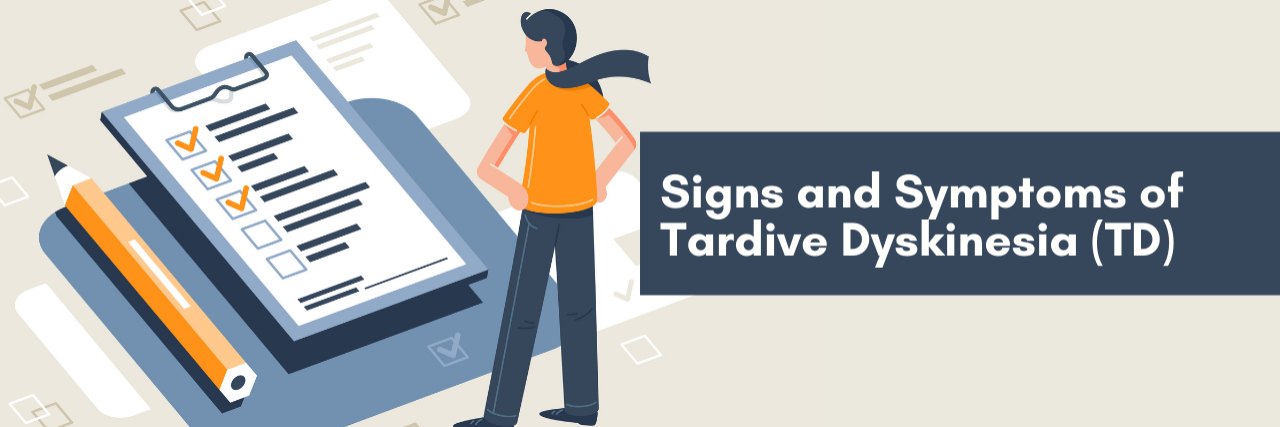As someone who lives with tardive dyskinesia (TD), I really wish I had known its signs and symptoms when I was first diagnosed. I didn’t even know it existed! A neurological condition that develops from long-term anti-psychotic medication use, TD is a disorder that can be either temporary or chronic, which depends on a number of factors that can vary for each individual.
TD is in a class of disorders known as dyskinesias, which are broadly defined as involuntary movements. Dyskinesias are characteristic of conditions like Huntington’s and Parkinson’s diseases. However TD is unique in that it is caused by medication; put another way, you cannot develop TD unless you’ve taken one of the medications that can cause it.
Involuntary movements, or sometimes called “tics,” is an intentionally broad and vague definition of dyskinesias. Simply put, any part of the body that moves can be affected by TD. Facial muscle tics are the most common in TD patients, specifically the tongue, lips, eyes, cheeks and jaw. My psychiatrist once described the “rule of thumb:” TD is more likely to affect muscle groups in the higher parts of the body, and likelihood of symptoms decreases as you move down toward the feet.
These tics can all feel and look different, it’s difficult to describe what it feels like to have your body move in involuntary ways. However TD is diagnosed based on those tics look like. Involuntary facial and neck movements can include (but aren’t limited to):
- Tongue protrusion (sticking out your tongue)
- Puffing cheeks
- Eye twitches/excessive or intense blinking (blepharospasms)
- Head bobbing
- Neck twists and turns
- Involuntary sounds (grunting, clicking tongue, etc.)
TD tics in other parts of the body vary as well. These can include (but again aren’t limited to):
- Rapid/jerking movements in the arms or legs (chorea)
- Fidgeting
- Restlessness (shaking of legs that can look like nervousness)
- Impaired coordination of arm or leg movements, including walking (ataxia)
In addition there is an important detail in TD in terms of the biological causes of these movements. TD is uncontrollable movements and needs to be differentiated medically from something called dystonia. Dystonias are uncontrollable muscle contractions, but they can produce very similar looking tics to TD. Doctors who specialize in movement disorders will know the difference; TD symptoms do not include muscle contractions.
This article should not be considered professional medical advice or used to self-diagnose any symptoms. The purpose of knowing signs and symptoms of something like TD is not to encourage people to make unilateral decisions about their medication. Rather, had I known the signs, I would’ve continued to take the anti-psychotic medications, but I would’ve discussed it with my doctor at my next appointment. In other words, don’t discontinue medication without your doctor’s approval or input. Unfortunately, I did not know the signs, so my tics went unnoticed for a considerable amount of time. It’s been many years since they started, so my condition is now considered chronic. However, the chances of TD becoming chronic are much lower when signs and symptoms are noticed earlier. If you are currently taking certain medications like anti-psychotics, watch for these symptoms and know when you should talk to your doctor.
I’ve chronicled my journey with TD on The Mighty extensively, and it isn’t an easy condition to live with. My journey has transformed into movement disorders beyond TD, but TD will always be the first movement-related condition I ever experienced, and I still do to this day. I wish I had known what to watch for when I started my anti-psychotic medication; I can’t imagine how different my life would be now if I had. My hope now is that this article simply serves to educate and empower someone else that’s taking an anti-psychotic medication. If you notice anything out of the ordinary, speak openly and candidly with your medical provider. TD isn’t something you can ignore and just hope it goes away (that’s what I did). The earlier you spot it and talk to your doctor, the better chances of keeping it from becoming chronic and of finding relief sooner. Keep going with your health journey! It isn’t easy, but you deserve a thriving life, and you can get there.

